by Leslie Acoca, MA, MFT,
President of the National Girls Health and Justice Institute
More than 200 million of the nation’s children and youth are being asked to stay home with their families in order to keep them and everyone else safe from COVID-19. Meanwhile, 48,000 other American kids, between the ages of 12 and 17 — the majority of them children of color from low-income communities — are not at home, but in 2000 locked juvenile facilities across the U.S.
To make matters worse, apart from the threat of the coronavirus, these locked up children are among the most medically vulnerable adolescents in America, with lives that are routinely further compromised by the lack of adequate health and trauma screenings they receive in youth detention facilities — even during a pandemic.
As a researcher and creator of the Girls Health Screen, I have visited 60 locked youth facilities in 22 states documenting the perilously inadequate medical care received by thousands of teens.
One of those children was Jessica, a 12 year-old-girl, pulled out of her bed at night by law enforcement for failing to appear at a probation hearing, and then transported to a juvenile lockup in Albuquerque, New Mexico.
When I met Jessica in the detention holding room, she was still wearing her red plaid pajamas and socks without shoes. She stood on the concrete floor, silently crying, her hands cuffed in front of her, her cheeks red and her eyes bright from the fever she reported to me.
Jessica was asked a few general health questions by a detention officer, placed in a holding cell with other newly incarcerated, medically at-risk children, then stripped of her health insurance within a few hours, due to a little known federal provision that prohibits Medicaid payment for most health care services provided to individuals while incarcerated — even kids — under a policy known as the “Inmate Exclusion.”
Then, after a cursory visual inspection by a nurse, Jessica was locked in a crowded, unsanitary unit sharing one bathroom with 30 other girls. A few days later, I learned that several children and a staff member in the facility had contracted strep throat.
I was alarmed, but not surprised.
A study conducted by the National Girls Health and Justice Institute (NGHJI) and the Children’s Hospital of Philadelphia, revealed that 11% of girls entering locked detention nationally had recently been exposed to Tuberculosis. What will happen when COVID-19, also a highly contagious, airborne disease, arrives in these juvenile facilities?
The NGHJI study also revealed that, largely due to that same hidden provision of the 1965 Federal Medicaid Law called the Inmate Exclusion, there were almost no research-based, medical intake screens for thousands of children entering detention. Consequently, infectious and communicable diseases, like flu, measles, and Tuberculosis can easily arrive undetected. Now, COVID-19 is added to that list of dangerous possibilities.
Health and justice reform in our juvenile facilities is already a human rights necessity. Now the COVID-19 pandemic makes the issue far more urgent.
The four steps below can help defuse the COVID-19 health time bomb that could all too easily detonate in locked juvenile facilities:
First: Release non-violent, detained youth, especially pregnant girls, to their homes and restore their health insuranc
Second: Immediately install evidence-based physical and mental health screening in all youth detention facilities, and treat urgent health needs as soon as they are identified. This includes screening for COVID-19, and acting promptly to contain further spread in locked youth facilities.
Third: Conduct juvenile court hearings on time and via remote appearances, so that youth awaiting adjudication are not unjustly detained, while all involved in the hearings are still kept safe.
Fourth: Congress must end the Inmate Exclusion, and require that enforceable, medical standards govern every juvenile detention facility, as well as every adult jail and prison in the U.S. Taken together, the juvenile and adult locked correctional systems are right now exposing roughly 2.4 million children and adults, not just to punishment, but to illness and possible death.
Yes, we know that U.S. residents under the age of 18 are less likely to fall ill with COVID-19 or require intensive care, as compared with older Americans.
Yet, according to a recent study conducted by the CDC, among 149,000 COVID-19 infections reported in the U.S. through April 2, for which age was known, 2,572 of those diagnosed were people under the age of 18. In other words, youth are not free of risk.
During these past anxiety-filled weeks we are all experiencing, I’ve found myself thinking about the scores of girls I interviewed in Los Angeles County Probation’s juvenile halls and youth camps during the period from 2012 to 2018, when I was working to improve their health and trauma care.
Among those who have entered my thoughts is a fourteen-year-old girl who I met at one of LA’s youth camps. When I was introduced to her, she was wearing a bright pink t-shirt, which she’d earned at the camp as some sort of reward. I was beginning to ask her questions when suddenly she turned to me with one hand on her hip, her expression heated. “WE ARE NOT NOTHING!” she said.
And that’s the point.
Their hair pulled back tight, their faces scrubbed of any makeup, and dressed in loose sweats, the thousands of girls I’ve met in youth lockups could be anyone’s daughters. They could be mine. They could be yours. They are ours.

Leslie Acoca, 2nd from left, at Camp Kenyon Scudder, Los Angeles County, courtesy of the Girls Health and Justice Institute
And they do not deserve to fall ill from this deadly virus, simply because no one has decided to do whatever it takes to keep them safe.
Unless otherwise noted, all photos are by Richard Ross from his widely honored book, Girls in Justice.

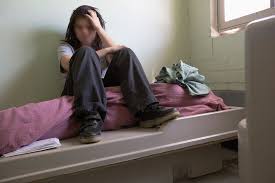
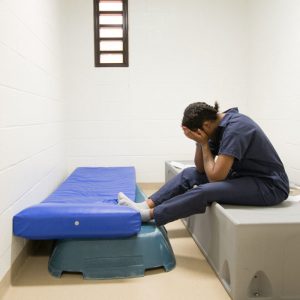
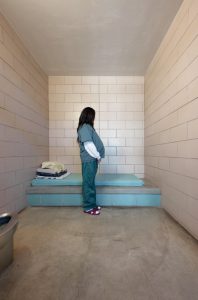
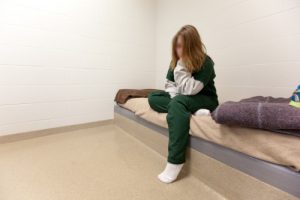
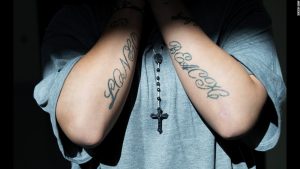
What the author fails to mention is that camps and jails in LA Co. have medical personnel on site on a daily basis that see anyone with a medical complaint – far better than most citizens have. If doctors and nurses working in hospitals taking every precaution cannot completely avoid catching the corona virus, how exactly are custodial personnel supposed to prevent it in detention facilities?
What the author fails to mention re the, “WE ARE NOT NOTHING” comment is that this reflects the self image of a lot of inmates – juvenile or adult. Detention facilities often house people that have suffered terrible experiences in their homes/communities for years – don’t blame the facilities or those that work in them for those experiences.
The constant drum beat here of the poor little children or the poor inmates has gotten old. Some authors are well intended but the editorials often fail to address the entire picture. No one should be incarcerated that is a low level offender and complies with court orders but there are many people that are violent and/or routinely don’t appear in court as ordered. What would you do with them? Provide judges and prosecutors with some reasonable suggestions and you’ll get a lot more credibility.
Well said
What a load of lying hypocritical Libturd crap. Libturds especially the females send their message loud and clear that they are for late term 3rd trimester abortions/murder but then turn around and cry crocodile tears for these juvies. Nope, not buying it. Btw, to the writer, how many juvies have you sponsored or taken into your home? Libturds/Demonrats are satan’s minions.
Hello Pro Justice,
I completely understand your comment- but unlike in the community incarcerated kids are cut off from all insurance coverage- detention docs and nurses often do their best-but they have limited information on the kids that are often medically very high risk, and have them for a short time, with no continuity of care which causes risk to them-and later to their communities. It casts about 287k per year-including medical costs to lock up each juvenile. That seems like wasted money and a wasted opportunity to promote individual and community health.
Also, I got into the field of health and justice because my younger brother was brutally murdered by a young offender in Los Angeles. After meeting with the offender face to face in a maximum security prison, I could see that the way to stop violence among youth was not to try to rehabilitate adults like him-which is very hard to accomplish- but to reach at risk kids early before they become violent.
early.
The Girls Health Screen was based on five national studies that revealed that access to health care reduces re-offending among girls by 72%.
Thank you for reading the article!
Leslie Acoca, MA, MFT